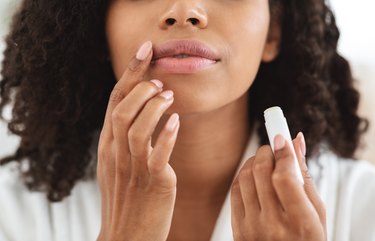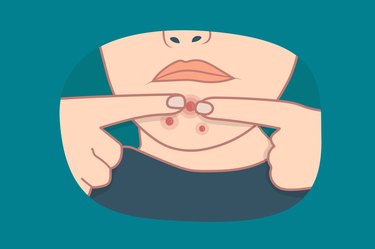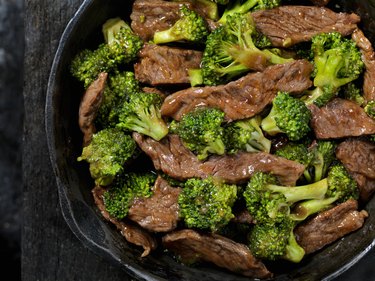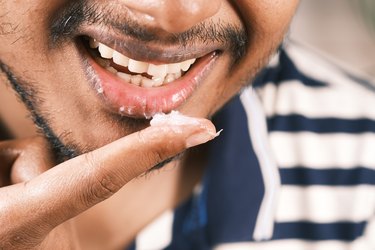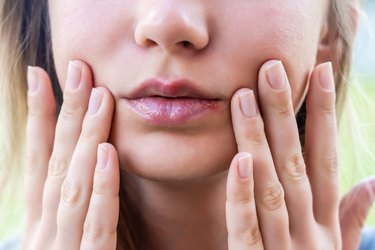
You just noticed a painful red bump on your lip. Is it a cold sore or a pimple?
Sometimes it can be tough to tell. "It can be easy to confuse a cold sore and a pimple as both can appear as red raised bumps, especially when the cold sore is at an early stage," says Marisa Garshick, MD, clinical assistant professor of dermatology at Weill Cornell Medicine in New York City.
Video of the Day
Video of the Day
Read on to see what sets the two blemishes apart, plus what you can do to help them heal.
What Is a Cold Sore?
Cold sores, sometimes called fever blisters, are small, fluid-filled blisters that form around the lips. You may feel an itching or burning sensation before the sores form, often in clusters. After erupting, they pop open and form a scab. They typically heal within two to three weeks, according to the Mayo Clinic.
Cold sores are infections typically caused by the herpes simplex virus type 1 (HSV-1), which can be spread by close contact, kissing or oral sex. When you get infected with HSV-1 for the first time, you might also have a fever, sore throat, gum pain, a headache, muscle aches or swollen lymph nodes, per the Mayo Clinic.
What Is a Pimple?
Pimples develop when your skin's oil glands get clogged with dirt or bacteria. They can sometimes become red or inflamed or leak pus or fluid.
Pimples aren't caused by a virus, and they're not contagious. Instead, they're just the result of excess gunk on your skin. It's common for them to form around the lips or the chin, but they can also pop up on your cheeks, nose, forehead, neck, back, upper arms or chest, per the Cleveland Clinic.
How to Tell the Difference
There are some tips that can clue you in to whether you're dealing with oral herpes versus acne. According to Dr. Garshick, here are some of the key differences:
Cold sore | Pimple | |
|---|---|---|
Location | Usually around the lips | Anywhere on the face, neck, chest or back |
Appearance | Initially a cluster of small blisters filled with clear fluid. (Cold sores don't typically have a white head.) Once the blisters pop, a scab forms. Typically the area around the blister is more noticeably red. | Typically a single red bump. The bump might have a white head that leaks pus. |
Feeling | Burning, itching or tingling, especially before erupting | Tender or painful when it appears |
How to Treat a Cold Sore
Cold sores often clear up on their own within two to three weeks, per the Mayo Clinic. But antiviral treatments (which come in cream or pill form) can speed the process along. "The best way to treat a cold sore is by using valacyclovir, a prescription antiviral," Dr. Garshick says.
Over-the-counter ointments containing docosanol — like Abreva Cold Sore Rapid Pain Relief ($9.99, Amazon) — are also effective. But both prescription and OTC treatments work best when used at the first sign of the burning or tingling that often precedes a cold sore.
In addition to medication, "adding a warm compress will alleviate symptoms," Dr. Garshick says. Once the sores burst open, you can apply a petroleum-based healing ointment like Vaseline ($7.59, Amazon) to encourage the scab to heal.
Cold sores will burst open on their own, by the way, so you shouldn't pop them. "It can slow the healing process and increase the chances of scarring or spreading the cold sores to other areas or people," Dr. Garshick says. To limit spread while you have an active outbreak, avoid sharing drinks or utensils and kissing loved ones, per the Mayo Clinic, and wash your hands regularly.
How to Treat a Pimple
Most pimples will go away on their own within three to seven days, according to the Cleveland Clinic. But again, there are things you can do to try to get rid of one sooner.
"It's best to treat a pimple with acne-fighting ingredients including benzoyl peroxide and salicylic acid," Dr. Garshick explains. "While it is generally best to treat the whole face to prevent breakouts, in some cases a spot treatment can be helpful to reduce a larger breakout."
She recommends trying Neutrogena On-the-Spot Treatment ($7.99, Amazon) or Vichy Normaderm SOS Acne Rescue Spot Corrector ($22.99, Dermstore).
Applying a warm compress will also help the pimple heal faster by boosting blood flow to the affected area. If your first priority is reducing pain or tenderness, apply an ice pack wrapped in a kitchen towel for 10 minutes at a time. It'll reduce blood flow to the area and tamp down inflammation, according to the Cleveland Clinic.
And again, try to resist the urge to pop. "It can lead to worsening pain, inflammation and scarring and increase the chance of infection," Dr. Garshick says.
When to See a Doctor
Both cold sores and pimples will go away with at-home treatment. But you should let your doctor or dermatologist know if a cold sore isn't clearing up, if you'd prefer medication to help it go away faster or if you're getting cold sore frequently. You should also let your dermatologist know if your acne is severe or affecting your day-to-day life.
Cold sores can cause serious complications if you have a weakened immune system. Let your doctor know right away if a cold sore develops and you have HIV/AIDS or eczema or are on chemotherapy or other immunosuppressive drugs, according to the Mayo Clinic.
FAQ
Common Questions
Can you pop a cold sore?
Even if it's tempting to pop the blister-like bumps, you should avoid doing so. Popping a cold sore can cause scarring and potentially spread the infection to other parts of your skin, Dr. Garshick warns. It also makes it easier to spread the virus to other people.
Should I try to pop lip pimples?
Again, no. Popping a pimple around your lip can cause scarring and spread bacteria that could lead to more pimples, Dr. Garshick says. Plus, it can be pretty painful.
Is it better to dry out a cold sore or keep it moist?
Keeping the area moist will help it heal faster. "Use a healing ointment like Vaseline or Aquaphor to provide a barrier to protect the skin from external irritants," Dr. Garshick says.
Was this article helpful?
150 Characters Max
0/150
Thank you for sharing!
Thank you for your feedback!
Is this an emergency? If you are experiencing serious medical symptoms, please see the National Library of Medicine’s list of signs you need emergency medical attention or call 911.
